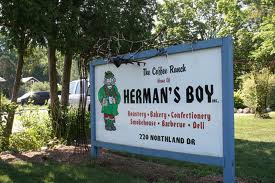
Confused about coffee terms? What should we know about coffee? Today hear from our hometown coffee roaster!
If you love coffee, today's post will help you understand the terms associated with it, and you'll hear from Floyd, a local coffee roaster in our hometown. The store he owns with his sons is where we get all of our coffee, and because it's so good, now I can't really enjoy any other kind. Everything else tastes off to me and is no where near as smooth and wonderful. I was excited to learn more from him about where our coffee comes from. Even though it isn't grown locally, it feels good buying from a local roaster who we trust to know where to get the best beans and how to handle them safely.
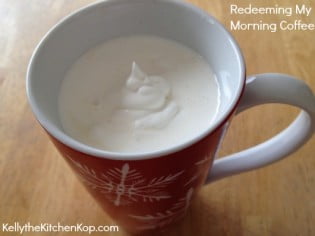 You may also want to check out these posts:
You may also want to check out these posts:
- Redeeming my Morning Coffee: What should we and should we not be adding to our coffee?
- Getting rid of the plastic toxins in your coffee. (If you have a Keurig-type coffee maker, you'll want to read this. Avoid using stryofoam cups whenever possible, too!)
- Should we be drinking coffee? (A good, balanced post from my friend, Kristen.)
First, though, you'll hear from Peggy, a long-time reader friend, about which coffee is best, along with her thoughts after doing a bunch of research on coffee.
What Peggy found in her research:
“I did a bunch of research on coffee and learned some important things…
-
- First, some people tolerate it better than others.
- It can be slightly dehydrating and can cause slight calcium loss, so if you're dealing with those issues, best to minimize coffee intake.
- Coffee beans are susceptible to mold, especially beans that are handled poorly, and mold MAKES YOU SICK.
- Low end (aka cheap) coffee is a blend of beans from a lot of places, beans that don't make the grade for high end (aka expensive) coffee, and beans that are poorly handled (think of a pound of ground meat coming from thousands of cows and you'll get why that's a bad idea.)
- High temperature roasting destroys the valuable antioxidants in coffee.
- The processes of making decaf are not health-sustaining.
- Boiled coffee tastes BAD.
- Coffee growers are often not paid reasonably for their product.
So, for me: single origin beans from a reputable source, shade grown, fairly traded, low temperature roasted, NEVER decaffeinated, ground immediately before use, brewed with a pour-over or french press with the purest water I can manage, served with A2 grassfed raw cream (or blended with unsalted butter from A2 grassfed raw cream). Yeah, I'm a coffee snob. But you know what? One cup of that and I don't need five cups of Maxwell House.”
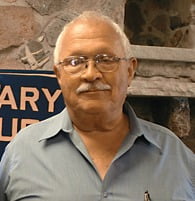 A conversation with Floyd, owner of Herman's Boy in Rockford, Michigan:
A conversation with Floyd, owner of Herman's Boy in Rockford, Michigan:
When I spoke with Floyd, I asked him about some of the coffee terms Peggy used, and I also asked some questions that I'd been wondering about coffee for years…
- Do you do ‘low-temp roasting' to preserve antioxidants? “No. Slow, small-batch roasting is what we do. Big companies can roast as much as 100,000 pounds in 6 minutes; we do 25 pounds in 25 minutes – slow-roasting preserves antioxidants.”
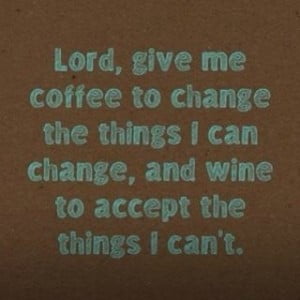 Why does your coffee stay fresh in the freezer? “We roast only small, 10 to 25 pound batches, and then the coffee beans are cooled with air only. (Larger coffee roasters must use water to quickly cool the beans and keep them from changing the roast darkness.) As long as they're absolutely dry, the freezer will prevent the coffee, beans or ground, from deteriorating, causing a rancid, bitter taste. We know this method keeps coffee fresh up to 6 months in the freezer, we've done experiments and even coffee snobs can’t tell. Remember, just as you don't ask when bread was sliced to determine its freshness, but instead ask when it was baked, with coffee you should ask when it was roasted, because when it was ground or brewed doesn't determine its freshness. We also suggest that our customers buy ground coffee from us and freeze instead of grinding it at home, because our grinders will grind more evenly and finer than most home models, and without changing the flavor of the coffee.“
Why does your coffee stay fresh in the freezer? “We roast only small, 10 to 25 pound batches, and then the coffee beans are cooled with air only. (Larger coffee roasters must use water to quickly cool the beans and keep them from changing the roast darkness.) As long as they're absolutely dry, the freezer will prevent the coffee, beans or ground, from deteriorating, causing a rancid, bitter taste. We know this method keeps coffee fresh up to 6 months in the freezer, we've done experiments and even coffee snobs can’t tell. Remember, just as you don't ask when bread was sliced to determine its freshness, but instead ask when it was baked, with coffee you should ask when it was roasted, because when it was ground or brewed doesn't determine its freshness. We also suggest that our customers buy ground coffee from us and freeze instead of grinding it at home, because our grinders will grind more evenly and finer than most home models, and without changing the flavor of the coffee.“
- What does the term ‘fair trade' mean? “It can mean overpaying for a lower quality product. When this happens, have you really helped the grower? Instead, for higher wages, growers should be taught to provide higher quality coffee, not just rewarding people for living in poorer areas. It's just like government subsidies, it's a broken system. For example, we buy some of our coffees from La Manita farm in Costa Rica. There they provide health care, dental care, and lodging for their employees, but they'll be fired if they don't do the job correctly.” (See the bottom of this post for a video about this farm.)
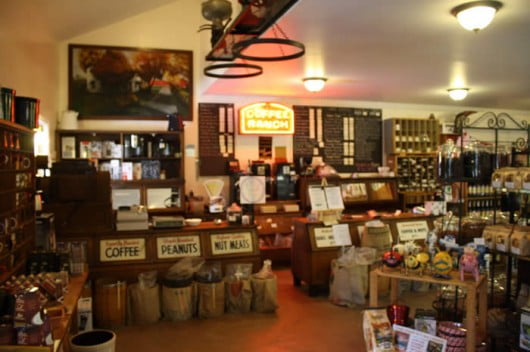
- How important is ‘shade-grown'? “Premium coffee is planted at a higher elevation and is considered ‘shade grown'. Too much sun hurts the plant, so fruit or citrus trees are grown strategically to provide shade. Coffee is not grown in the middle of a jungle.”
- What about the term, ‘organic', how can we know if coffee is chemical-free? “When we at Herman's Boy buy coffee, we only buy the highest grade Arabica beans available, we concentrate on quality first and the “buzz-words” second. Certifications on “organic” means there was a charge to get that certification and you spent more money. All premium coffees we buy are organic, whether it's labeled or not, because we know the sources, and it's grown at higher sea levels, 5000 feet and above, where there are usually no bugs.” (This is Kelly jumping in… I'm not so sure about this now, a few years later… I've been buying organic coffee because I've learned in my research that coffee is actually a highly sprayed crop…)
-
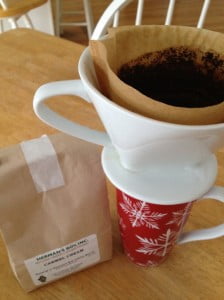 What do you think about flavored coffee beans? “To me that's like putting ketchup on a steak. Coffee is like the grapes used to make wine or like any other produce, it tastes different depending on the soil that it's grown in. When you drink flavored coffee you mask that and can't appreciate the subtle differences. I like to enjoy the taste of the good rare coffees of the world. I refused to sell the flavored coffee for years, but the ladies wanted it.”
What do you think about flavored coffee beans? “To me that's like putting ketchup on a steak. Coffee is like the grapes used to make wine or like any other produce, it tastes different depending on the soil that it's grown in. When you drink flavored coffee you mask that and can't appreciate the subtle differences. I like to enjoy the taste of the good rare coffees of the world. I refused to sell the flavored coffee for years, but the ladies wanted it.”
- Are decaffeinated coffees bad for our health? “You'll want to get a coffee that isn’t chemically decaffeinated – look for the Swiss water label – this is a patented process with no chemicals used. Surprisingly, most people can't tell a difference between our decaf and regular.”
A side-note about flavored coffees…
Floyd's son, Jeff, took me in the back one time and showed me the tiny amount of flavoring that goes into a large amount of coffee beans when roasting flavored coffees. Because of that I was okay with continuing to drink it, since I love the stuff, but Floyd got me thinking more about this. And this post did, too: The Dark Disgusting Secrets of the Flavor Makers. So I'm going to try getting a lighter roast of coffee the next time I go, and then adding some of my yummy real whipped cream, and maybe a drop or two or organic vanilla or almond extract, to see if I can make my own lightly flavored coffee. (I don't like sweet coffee, but for those that do, you could try honey, maple syrup, or another natural sugar.) Even better, I should start trying to adapt my palate so I can appreciate the taste of coffees from different parts of the world, as Floyd said. I'll let you know how it goes!
Watch this video on the La Manita farm in Costa Rica:
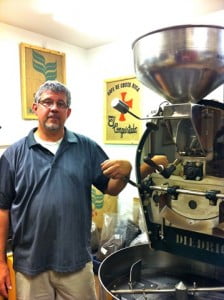 Floyd & Sharon Havemeier started The Melting Pot in Rockford, Mi in the fall of 1979, employing their teenage sons Jeff and Doug. The Melting Pot sold cheese & sausage from the Midwest, nuts roasted in Grand Rapids & Chicago, baked bagels and jumbo cookies, and sold coffees roasted by The Coffee Ranch of Grand Rapids, Michigan. In 1982 Floyd was offered the chance to buy the assets of the Coffee Ranch and did so. The equipment was moved to the shop in Rockford. The Coffee Ranch blend recipes were also part of the deal, and Jeff, Floyd and Doug were given a crash course on coffee roasting. Jeff eventually became the main roaster and learned his craft by trial and error, listening to his customers and asking advice of his green coffee bean brokers. The goal of Herman's Boy is to turn over its roasted coffee in less than 48 hours. They also desire to remain a small company and are a “store that never has a sale” – you'll never find coupons, as they believe in consistently offering a good product for fair prices. The Coffee Ranch roasting company has been roasting coffee in Kent County for 113 years, and they've owned the company for 33 of those years.
Floyd & Sharon Havemeier started The Melting Pot in Rockford, Mi in the fall of 1979, employing their teenage sons Jeff and Doug. The Melting Pot sold cheese & sausage from the Midwest, nuts roasted in Grand Rapids & Chicago, baked bagels and jumbo cookies, and sold coffees roasted by The Coffee Ranch of Grand Rapids, Michigan. In 1982 Floyd was offered the chance to buy the assets of the Coffee Ranch and did so. The equipment was moved to the shop in Rockford. The Coffee Ranch blend recipes were also part of the deal, and Jeff, Floyd and Doug were given a crash course on coffee roasting. Jeff eventually became the main roaster and learned his craft by trial and error, listening to his customers and asking advice of his green coffee bean brokers. The goal of Herman's Boy is to turn over its roasted coffee in less than 48 hours. They also desire to remain a small company and are a “store that never has a sale” – you'll never find coupons, as they believe in consistently offering a good product for fair prices. The Coffee Ranch roasting company has been roasting coffee in Kent County for 113 years, and they've owned the company for 33 of those years.
Thanks Floyd and Jeff for your help with this post!
______________________
Here are the coffee posts from the archives:
- A good balanced article on the benefits vs. the risks to your health if you drink coffee: Should We Drink Coffee?
- Redeeming my Morning Coffee (What you should and should not be adding to your coffee.)
- A Cup of Coffee Without Plastic Toxins Please! (If you have a Keurig-type coffee maker, you'll want to read this.)
- Gettin’ Real About Coffee Enemas with a Q & A – Coffee Enema Benefits


 Why does your coffee stay fresh in the freezer? “We roast only small, 10 to 25 pound batches, and then the coffee beans are cooled with air only. (Larger coffee roasters must use water to quickly cool the beans and keep them from changing the roast darkness.) As long as they're absolutely dry, the freezer will prevent the coffee, beans or ground, from deteriorating, causing a rancid, bitter taste. We know this method keeps coffee fresh up to 6 months in the freezer, we've done experiments and even coffee snobs can’t tell. Remember, just as you don't ask when bread was sliced to determine its freshness, but instead ask when it was baked, with coffee you should ask when it was roasted, because when it was ground or brewed doesn't determine its freshness. We also suggest that our customers buy ground coffee from us and freeze instead of grinding it at home, because our grinders will grind more evenly and finer than most home models, and without changing the flavor of the coffee.“
Why does your coffee stay fresh in the freezer? “We roast only small, 10 to 25 pound batches, and then the coffee beans are cooled with air only. (Larger coffee roasters must use water to quickly cool the beans and keep them from changing the roast darkness.) As long as they're absolutely dry, the freezer will prevent the coffee, beans or ground, from deteriorating, causing a rancid, bitter taste. We know this method keeps coffee fresh up to 6 months in the freezer, we've done experiments and even coffee snobs can’t tell. Remember, just as you don't ask when bread was sliced to determine its freshness, but instead ask when it was baked, with coffee you should ask when it was roasted, because when it was ground or brewed doesn't determine its freshness. We also suggest that our customers buy ground coffee from us and freeze instead of grinding it at home, because our grinders will grind more evenly and finer than most home models, and without changing the flavor of the coffee.“
 What do you think about flavored coffee beans? “To me that's like putting
What do you think about flavored coffee beans? “To me that's like putting 
Amanda B says
As someone who’s worked as a barista for over 6 years, I have to say that I strongly disagree with Floyd’s suggestion to store ground coffee in the freezer. He says he’s tested this with great results (“even the coffee snob can’t tell); my first question to him would be, what else was in your “test freezer”? Was it just other coffee or was it like an actual home freezer with meats, leftovers, vegetables, and any number of other foods? Coffee, especially in its ground form, is very absorbent. Unless you want raw chicken flavored coffee, I strongly recommend against storing it in the freezer, refrigerator, or anywhere besides an opaque sealed container (opaque because light will deteriorate coffee).
As for the grinder issue, that is hardly an issue if you invest in a quality grinder. Grind one of the most important factors in making a great brew, whether it’s drip brew, moka pot, French press, home espresso machine, pourover, etc. Blade grinders (most of the cheap ones you find at Target, Wal-Mart, etc.) DO NOT produce an even, consistent grind. If you’re serious about making excellent coffee at home, invest in a high quality burr grinder. Whereas with a blade grinder the coffee is spun around in a chamber while being chopped up over and over by a blade, a burr grinder produces a more consistent grind because the beans pass through the burrs only once. They’re really not that expensive and will last for years with proper care and maintenance.
Buy the best quality whole beans you can find and buy only what you can use in 1-2 weeks, invest in a quality grinder, store your whole beans in an opaque airtight container at room temperature, use great-tasting filtered water, and take good care of your equipment, making sure to clean it often. That’s really all you need to know about making excellent brew at home.
KitchenKop says
Hi Amanda,
As far as the freezer issue, we’ve stored ours just as they recommend, with plenty of other stuff in our freezer, and it has never taken on any odors or funky tastes, it’s always really good. 🙂
Kelly
Kenn32 says
Aw Kelly, I really hate to be a party pooper on your coffee story, but there are a couple of points that are flat out wrong.
Peggy, has stated that high temperature roasting destroys antioxidants. Antioxidants are formed during roasting, and dark roast coffees have more of them. Green coffee beans have very little.
https://www.sciencedaily.com/releases/2011/02/110202132607.htm
Also, there are issues with the reported coffee roasting technique that don’t meet coffee roasting standards.
The claim of slow roasting being better; roasting 25 pounds in 25 minutes is quite shocking. Any roast that extends beyond about 15 minutes will be getting into a range where it is considered baked, and that would be considered a coffee defect, producing coffees that don’t have much character, very flat tasting and boring. Baked beans never get hot enough fast enough in the roast process, they are just slowly cooking, not roasting. Internal bean temperature for a properly roasted City Roast which might be considered medium brown will range from 415 to 435 degrees. A Full City roast will have a rich brown color and may show some droplets of oil. Internal bean temp will range from 435 to 445, and of course, always reaching these temps within that max 15 minute limit, often sooner being even better, but of course certain varietals may require different roast profiles to bring out specific flavor notes.
I don’t buy the recommendation to have beans ground where you buy them because most home grinders don’t grind fine enough. Even the crappiest grinders will produce a suitable fine to medium drip grind. If you’re using a press pot, you need a coarser grind. Grinding coffee beans just before brewing helps ensure the freshest, best-tasting coffee. Freezing isn’t a good idea since coffee, especially ground, will absorb odors quite readily unless you can guarantee that the package is vapor proof. If you have a nearby roaster so you can always have fresh beans, or do your own home roasting as I do, then freezing should be the last thing necessary.
Also, don’t use toxic plug-in air fresheners anywhere in your kitchen or near your coffee storage. The chemicals in them will permeate coffee, bread, any sort of foodstuffs, and really make your coffee smell and taste hideous.
Maryjane says
Just a note from personal experience: I visited a place in Jamaica in the Blue Mountains, where they grew, roasted, and sold their own coffee. They had a small roaster that probably could only hold about 10-20 pounds of coffee at a time. I don’t know exactly how long they roasted it, but it was definitely longer than 15 minutes. They produced the most WONDERFUL coffee I have ever tasted. It was smooth, flavorful — definitely not boring.
I doubt that Floyd would have been in business so long if his coffee was “flat-tasting and boring”.
I guess everyone has a different preference for how they like their coffee. One thing for sure — “how to make the best coffee” is definitely controversial!
KitchenKop says
Hi Kenn,
I’m not convinced that your information could be correct after having tasted this coffee pretty much every day for the last several years, I can tell you it is *amazing*, so they must be doing something right. That I know for sure. 🙂
Oh and one more thing I should add… Herman’s Boy *sells* coffee grinders at their store and they don’t make any more money on the coffee whether they grind it for you or not, so it’s not like they have anything to gain by suggesting you let them grind it for you. Just wanted to point that out.
As Maryjane said, coffee sure is a hot topic!
Kelly
Sarah says
Is it possible that therapeutic grade essential oils would work for flavoring coffee?
Maryjane says
My experience has been that the heat of the coffee makes the essential oils evaporate too quickly (because they are so volatile), so they are very strong at first, but you can barely taste them by the end of the cup. They don’t mix well in the coffee either.
Lea Harris says
Yes, you *can* use essential oils to flavor coffee, although I don’t advise it. EOs and water (coffee) do not mix and when the concentrated EOs hit your skin, you risk them causing irritating, rashes, burning, or (over the long-term) much worse.
If you *do* add EOs, please only add 1 drop, and also add some fatty milk or cream to help dilute the essential oil.
Also please do your research to see if that essential oil should be ingested at all – different essential oils carry different benefits and risks. Some interact with medications, and some aggravate certain health conditions. Peppermint is one that should be OK to add for a flavoring.
Since I know it will come up, bottles with a “supplement facts” on them are not automatically assumed to be OK to ingest. There are very few EOs that are OK to be ingested. The “supplement fact” label is just how that company decides to market their essential oils – it does not make them OK to ingest.
ValerieH says
This is a really good article! I learned a lot about coffee and mold on coffee from the bulletproof exec. I’m glad your roaster knows this. I live in the Chicago burbs. We have lots of roasting companies in the region. I called around but not many know what your article says. Your guy is a rare find! I try to buy coffee that fits your criteria above. I will have to ask my local coffee house if they have beans I can buy that match. I have been buying fair trade organic Central American coffee from a co-op type grocery store. My church sells from Equal Exchange, which is a fair trade company. I have not asked all these questions. I just assumed they didn’t have all this.
I think adding flavors at home is the better option. I really like orange flavored coffee or chocolate. I have wanted to buy orange extract from Penzeys for a while now.
Maryjane says
I assume they don’t ship?
I’ll have to try to get to Rockford, the next time I’m in GR.
Becky D says
They DO ship!!!
https://www.hermansboy.com/4011/With_FL/Html/coffeeranch.html
KitchenKop says
Great, thanks for checking that Becky! I’m so blessed that we live right here!
If you guys go in or order any, be sure to tell them how you heard about their store. 🙂
@Stephanie, you probably missed them because they’re down around the bend from downtown, within walking distance, but you can miss them if you don’t know to look.
Kel
Maryjane says
Thanks, Becky!
Becky D says
LOVE LOVE LOVE Hermann’s Boy coffee. I remember talking to the owner about how their coffee was purchased and roasted back in the 90’s when they were still in downtown Rockford. Back then, my main concern was that it was fair trade – since then, I’ve become even more particular ( 🙂 ) and I’m thrilled to read his explanation of “organic”. Made me happy!
Sarah says
When we get there I will be heading over to try it! Thank you for letting us know about a shop and education us on coffee!
stephanie says
Thanks for Sharing!! My parents live in the area and when visiting, we took a trip to Rockford. Such a nice town. I can’t believed I missed the coffee shop! We enjoyed the bookstore and the yarn store. I must head back to enjoy the coffee shop!!
Shaina says
Thanks for posting this! This coffee shop is right around the corner from me. Look forward to visiting a good, local shop!